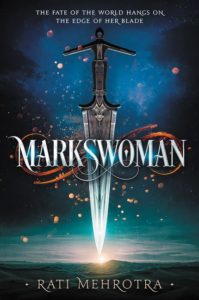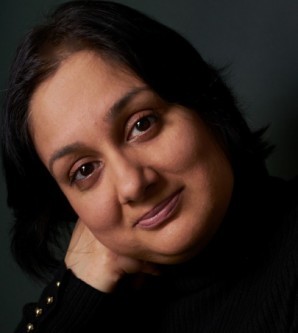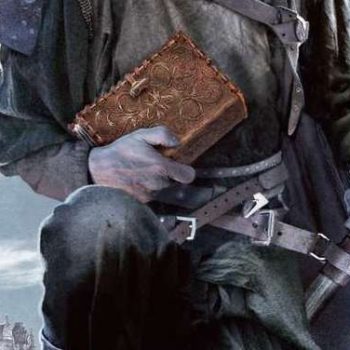
Memory and Truth: An Interview with Rati Mehrotra
- Posted by Augur Blog
- On January 11, 2019
- 0 Comments
- author interview, rati mehrotra, sunburst award
SFF writer and bookworm extraordinaire, Rati Mehrotra, chatted with Augur about the joys of world-building and writing within the speculative with the “rules” of the realistic. Her debut novel, Markswoman (the first in a series), was published in 2018. In the same year, her short story “Hacker’s Faire” was shortlisted for the 2018 Sunburst Award for short fiction.

How did “Hacker’s Faire” take shape for you?
I adore markets of all kinds. The actual Faire was the first thing to take shape in my mind. I imagined a far-future market built on the remains of a bombed out space station, where you could buy or barter any tech, where discarded robots mingled with enterprising or desperate humans, and everything had a price. I had my setting, and as soon as I had it, my character Lazlo came to life, looking to fix a broken robotic cat for his daughter.
Memory and truth-telling both appear as double-edged swords in “Hacker’s Faire,” especially when it comes to trauma. How did you approach writing the nuances of memory and truth? How did you choose which truths to tell about your characters?
The characters of this story edit themselves, deleting painful memories. It helps them keep going, one day after another, no matter what they’ve suffered. But I think when you lose your worst memories, you also lose a part of yourself.
The question is, do you have the strength to face what you’ve chosen to forget? Vajra does. It’s harder for Lazlo, Truthteller though he is. As for the onlookers, everyone believes what they wish, what is closest to their desired reality. In the end, though, our memories complete us. It is better, I think, to lead a damaged life than a false one.
“Hacker’s Faire” takes place during a stark sci-fi future, but is set in places our Toronto readers will recognize. Why did you choose to set your story in the Toronto area?
One of my beta readers said it was quite entertaining to read such a stark tale set in a place as bland and inoffensive as North York. What can I say? I am a Torontonian, and I work with what I have! Seriously, though, I love my city, and I love how safe it is, relative to other parts of the world. I write from a place of safety, and it is this that allows my imagination to run free. I feel very privileged.
Are you a Truthteller or would you edit your own memory?
A difficult question to answer unless actually presented with such a choice. But I believe, even if something terrible happened, I would rather remember it. Even if it made me frightened or sad. There is something to be learned from everything that happens, even things that hurt us.
Your first novel, Markswoman, came out earlier this year and it also stretches across genres—here are elements of both fantasy and sci-fi. The novel is also set in central Asia. How did the experience of creating the world of Markswoman differ from writing your richly imagined short stories?
World-building is my favourite part of any project, short or long. With
How do you balance the realistic and the speculative in your work? Have you run into any challenges?
Any narrative has to be internally consistent and recognize the intelligence of its readers. You can have magic, but your magic should obey certain rules. You can have aliens, but they’d better be truly alien, not humans with large heads and green skin. You can be whimsical, but there better be a reason you’ve got a talking snake in your book.
Moreover, just because you’re writing speculative fiction, doesn’t mean you can play fast and loose with the laws of nature. Faster-than-light travel? Not possible. It’s a well-established trope, so you can use it, but you should have an explanation for it.
What would you like to see more of in speculative fiction, Canadian or otherwise?
I would like to see older women heroes. I have had a surfeit of fantasy books with seventeen-year-old protagonists. This is also something I am addressing in my own writing. My current
Are there writers, established or new, you would love to have more people read?
I highly recommend reading the works of Sofia Samatar. Her book A Stranger in Olondria won the World Fantasy Award for Best Novel in 2014. Her writing is rich and detailed, and she builds an immersive world you can fall into.

Born and raised in India, Rati Mehrotra makes her home in Toronto, Canada. Her first book, Markswoman, was published in January 2018 and the sequel, Mahimata, will be published in March 2019. Her stories have appeared in Apex Magazine, AE – The Canadian Science Fiction Review, IGMS, Podcastle, Cast of Wonders, and many more. Find out more about her at ratiwrites.com or follow her @Rati_Mehrotra.
Liked this interview? Check out another one: Writing The Unsaid And Forgotten: An Interview With David Demchuk



0 Comments